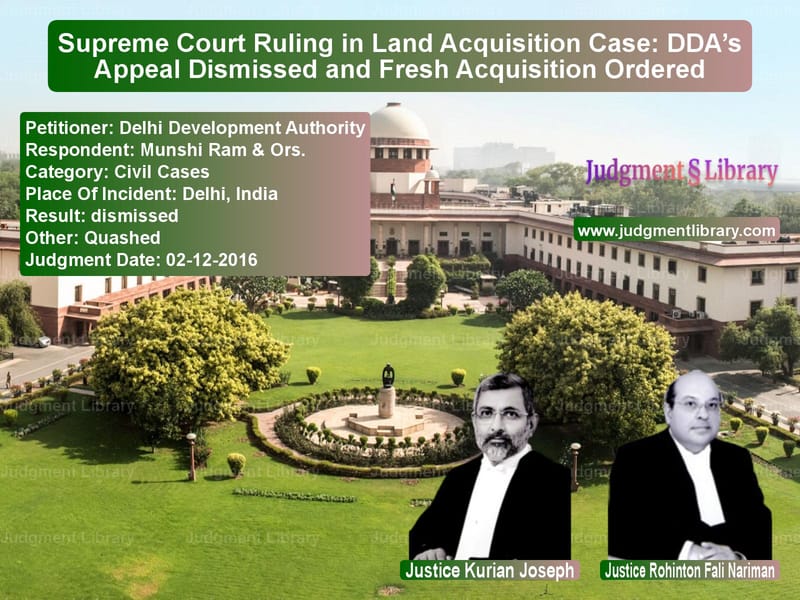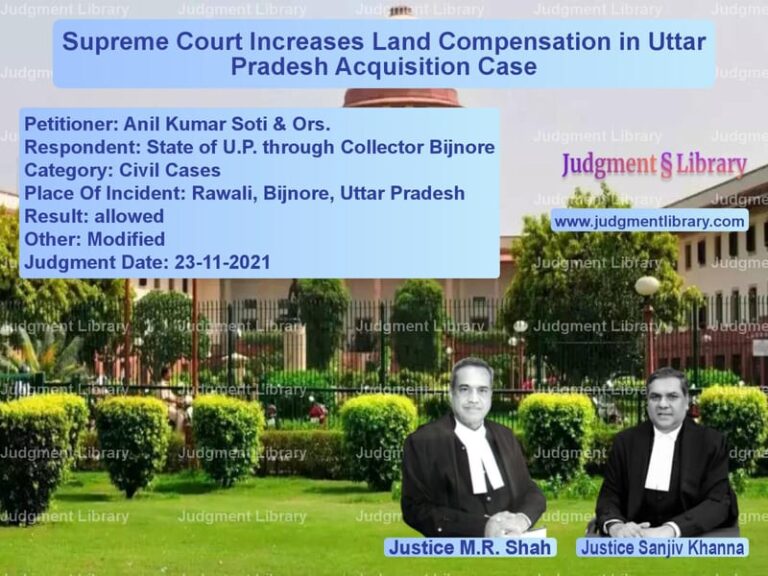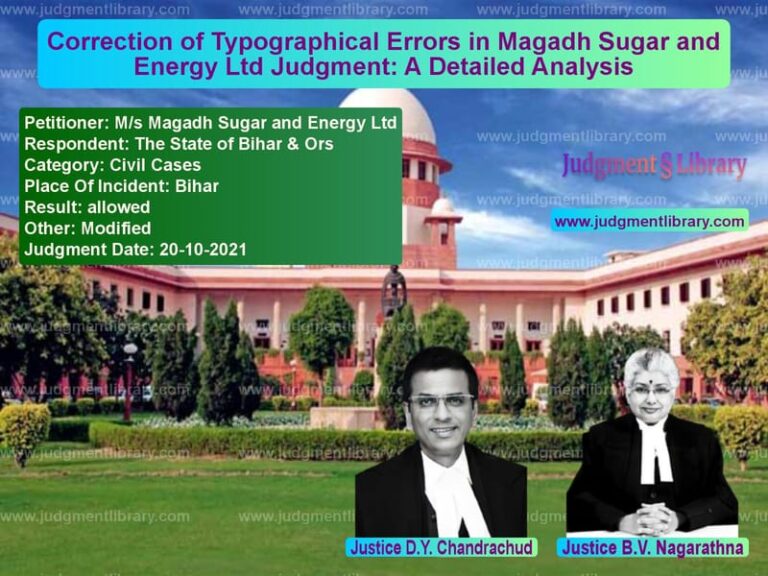Supreme Court Ruling in Land Acquisition Case: DDA’s Appeal Dismissed and Fresh Acquisition Ordered
The case of Delhi Development Authority vs. Munshi Ram & Ors. revolved around a dispute regarding the validity of land acquisition under the Right to Fair Compensation and Transparency in Land Acquisition, Rehabilitation and Resettlement Act, 2013 (LARR Act). The Supreme Court dismissed the Delhi Development Authority’s (DDA) appeal and ruled that the DDA must initiate fresh acquisition proceedings under Section 24(2) of the LARR Act, due to the failure to meet the statutory requirements of compensation and possession within the prescribed period.
Background of the Case
The dispute arose from the DDA’s acquisition of land for public purposes in Delhi. The landowners challenged the acquisition, arguing that compensation had not been paid, and possession had not been taken as per the legal requirements. In the case at hand, the DDA sought to retain possession of the land despite not fulfilling these requirements. The High Court had ruled in favor of the landowners, declaring the acquisition lapsed due to the failure to pay compensation and take possession. The DDA appealed the decision before the Supreme Court.
The Supreme Court took up the matter, considering whether the DDA’s actions complied with the provisions of the LARR Act and whether the acquisition had lapsed under Section 24(2) due to the non-payment of compensation and non-possession.
Key Legal Issues
- Whether the failure to pay compensation and take possession within the specified period under the LARR Act led to the acquisition lapsing.
- Whether the DDA could retain possession despite failing to comply with the requirements of the LARR Act.
- What is the procedure for initiating fresh acquisition proceedings under the LARR Act if the acquisition lapses?
Arguments by the Petitioners (Delhi Development Authority)
- The acquisition process was valid and completed under the Land Acquisition Act, 1894.
- There was no need to initiate fresh proceedings, as the land acquisition had been completed, and the DDA had possession of the land.
- The failure to pay compensation or take possession within five years was due to reasons beyond the DDA’s control, and the landowners’ claims were barred by limitation.
- The DDA had already fulfilled the procedural requirements, and the application of the LARR Act to this case was not justified.
Arguments by the Respondents (Landowners)
- The acquisition had lapsed under Section 24(2) of the LARR Act because the DDA had failed to pay compensation and take possession of the land within five years prior to the enactment of the LARR Act.
- Section 24(2) of the LARR Act provides that if compensation is not paid and possession is not taken within five years before 2013, the acquisition process becomes void.
- The failure to comply with the requirements of the LARR Act meant that the acquisition could not be retained by the DDA, and the land should be returned to the original owners.
Supreme Court’s Judgment
The Supreme Court ruled in favor of the landowners and dismissed the DDA’s appeal, stating the following:
- The acquisition had lapsed under Section 24(2) of the LARR Act due to the non-payment of compensation and non-possession of the land within the five-year period prescribed by the Act.
- The DDA was granted one year from the date of the judgment to initiate fresh acquisition proceedings under Section 24(2) of the LARR Act.
- If the DDA failed to initiate the fresh acquisition proceedings within one year, they would have to return the physical possession of the land to the landowners.
The Court stated:
“In case no fresh acquisition proceedings are initiated within the said period of one year by issuing a Notification under Section 11 of the Act, the appellant, if in possession, shall return the physical possession of the land to the owner.”
Impact of the Judgment
- Fair Compensation: The ruling ensures that landowners are entitled to fair compensation and timely possession of land, reinforcing the principles of justice under the LARR Act.
- Legal Precedent: The judgment sets a precedent for how Section 24(2) of the LARR Act should be applied, especially in cases where compensation and possession have not been fulfilled in the prescribed timeframe.
- Rights of Landowners: The decision strengthens the rights of landowners by ensuring that their compensation is in line with the true market value of their land, and that they are not unfairly treated in land acquisition proceedings.
- Government Accountability: The ruling holds the government accountable for adhering to the law and ensuring the rights of landowners are protected during the land acquisition process.
Conclusion
The Supreme Court’s decision in this case is a significant milestone in ensuring the protection of landowners’ rights under the LARR Act. By reinforcing the application of Section 24(2), the Court has ensured that acquiring authorities are held accountable for not meeting the statutory requirements of compensation and possession. The judgment also clarifies the process for initiating fresh acquisition proceedings and underscores the importance of transparency and fairness in the land acquisition process.
Don’t miss out on the full details! Download the complete judgment in PDF format below and gain valuable insights instantly!
Download Judgment: Delhi Development Au vs Munshi Ram & Ors. Supreme Court of India Judgment Dated 02-12-2016.pdf
Direct Downlaod Judgment: Direct downlaod this Judgment
See all petitions in Property Disputes
See all petitions in Landlord-Tenant Disputes
See all petitions in Specific Performance
See all petitions in Judgment by Kurian Joseph
See all petitions in Judgment by Rohinton Fali Nariman
See all petitions in dismissed
See all petitions in Quashed
See all petitions in supreme court of India judgments December 2016
See all petitions in 2016 judgments
See all posts in Civil Cases Category
See all allowed petitions in Civil Cases Category
See all Dismissed petitions in Civil Cases Category
See all partially allowed petitions in Civil Cases Category







